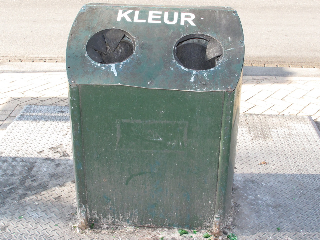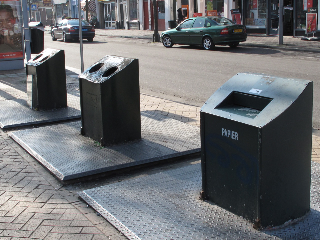 |
 |
The practice of glass recycling in Holland has been carried out for at least 20 years, in line with the EU directives on waste management and as part of an environmental policy. It is a statutory requirement that each district council (gemeente) is responsible for the collection of glass for recycling. For example in the place where I live, The Hague, in the beginning there were "glass banks" near shopping centres only, gradually they have been installed in and around most dwellings. These days, you don’t have to walk far to find such stations for recycling glass as well as paper. The nearest one from us is about 2 minutes walk from our house. There is a glass container for clear glass and another for coloured glass. The Council of The Hague arranges collection from these stations three or four times a week. The cost of the operation is borne by the Council which collects taxes from its residents for a range of services, such as rubbish collection, maintenance of the environment, traffic, policing, etc.
The recycled glass is then sold on to manufacturers who turn it into a variety of products, some may be made into glass containers again, others into building materials, such as ceramic sanitary ware and bricks. Although this way of recycling raw material is greener than putting the bottles in landfills or incinerators, the process of turning used glass into other products still requires energy, while the most efficient way of dealing with the empty bottles is to re-use them. In this regard, the Netherlands operate a container deposit legislation whereby empty glass bottles of some locally filled products, such as Heineken, have a 10 cent deposit on each of them; the consumer gets 10 cents by returning the empty bottle to the supermarket collection point. This glass will then be cleaned, sterilised and used again. For PET bottles, the deposit is 25 cents. The return rate is reportedly well over 90%.
The Netherlands is quite successful in recycling/reusing glass and paper overall; the record on other domestic waste is less impressive. The attempts to recycle household biodegradable matter (such as garden or food waste) and toxic waste (such as used batteries and medicines) have been less successful. After a short trial period, the weekly collection of biodegradable material and a periodic mobile collection point for toxic waste were shelved. These days there is no depository for garden/food waste and you need to take your toxic waste to a central collection point, and there are only a few plastic bottle depositories in selected areas.
Another credit to the Netherlands regarding waste control is the active participation of some partially funded social enterprises called Recycling Shops (Kringloopwinkels) since the 80s. The shop will collect all sorts of unwanted goods from your house, ranging from clothes through electrical goods to furniture. They sort out the useful from the unusable and deal with them accordingly, for example clothes that are still good would be sold in their shops and rags would be sent off as recycling material. Likewise, broken furniture or faulty electrical goods would be repaired and sold. In such ways, they serve a dual purpose: for a cleaner environment and for providing skill training as well as employment, quite often to the socially disadvantaged groups. Today around 54 such organisations are set up across the country, operating 175 charity shops in total.
Josephine Chu
31 Oct 2010
References:

